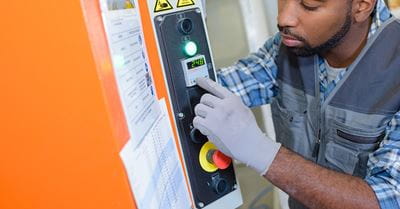Vertical Reciprocating Conveyors | Spokane

Raymond West supplies warehouse automation equipment such as VRC's.
We are among the largest suppliers of warehouse automation equipment in the state.
Call us today at (509) 728-6000.
What Is a Vertical Reciprocating Conveyor (VRC)?
A vertical reciprocating conveyor is a safe, economical, convenient means to transfer materials from one level to another. VRCs have use case scenarios in many different industries, including manufacturing plants, warehouses, distribution centers, and other multi-story operations. These versatile pieces of equipment can be readily incorporated into a building’s mezzanine, balcony, basement or any upper floor levels.
Vertical reciprocating conveyors consist of a shaft, a carriage, and a hydraulic or mechanical system. Vertical material lifts can be installed almost anywhere inside or outside of a structure. Gates and cages installed around a VRC shaft ensure employee safety and well being.
What Are Some Advantages of VRCs?
Safety: Many facilities rely on lift trucks for vertical movement of products. Although highly capable machines, lift trucks are primarily intended for the horizontal movement of goods. To save time and effort, workers may sometimes take their lift trucks above their height limit or move loads beyond their truck’s capacity rating. When these transgressions occur, the chances of an accident multiply.
For some vertical product movement, vertical reciprocating conveyors offer a safe and efficient alternative to lift trucks. Specifically designed and manufactured for each operation’s application requirements, VRCs greatly minimize the likelihood of human error.
In addition, vertical material lifts are designed to lift heavier loads more often. These more rapid cycle rates result in reduced labor expenses. For companies that have significant vertical transport demands, VRCs can enhance safety and decrease costs.
Customization: One significant advantage of VRCs is the degree to which they can be customized. Since standard elevators are engineered to safely move people, regulations have been put into place that restrict the weight capacity, speed and size of these machines. Although such regulations are appropriate for safely moving people, they are not necessary for high throughput movement of products in manufacturing plants, warehouses and distribution operations. Vertical lifts can be freely customized due to the fact that they are not bound by the same rules as passenger elevators.
Regulation: Vertical reciprocating conveyors are engineered to move materials only, while standard elevators are built to move both humans and freight. Because of this elemental difference, VRCs are exempt from the rigorous elevator regulations in most states.
On the contrary, VRCs are regulated by their own national code that is overseen by the American Society of Mechanical Engineers (ASME), one of the preeminent standards shaping organizations in the country. More specifically, vertical reciprocating conveyors must comply with ASME’s Safety Standard for Conveyor and Related Equipment (ASME B20.1-2018). This standard outlines the requirements for the construction, installation, operating procedure and servicing of conveyor systems.
Raymond West Is A Full Service Supplier of Vertical Reciprocating Conveyors
If you’re in the market for a VRC, want questions answered or need engineering support, Raymond West can help. Our material handling experts can help design, procure, set up and service a system that’s right for your business. Get in touch with us today!
Raymond West's Spokane branch services Spokane, Airway Heights, Spokane Valley, Liberty Lake, Post Falls, Hayden, Rathdrum, Coeur d'Alene, Medical Lake, Cheney, Pullman, Moscow, Moses Lake, Yakima, Wenatchee, Lewiston, Clarkston, Kennewick, Pasco, Richland, Walla Walla and all surrounding areas.
Raymond West | Spokane Material Handling Equipment Supplier
11002 E Montgomery Dr #100
Spokane, WA 99206
(509) 728-6000

